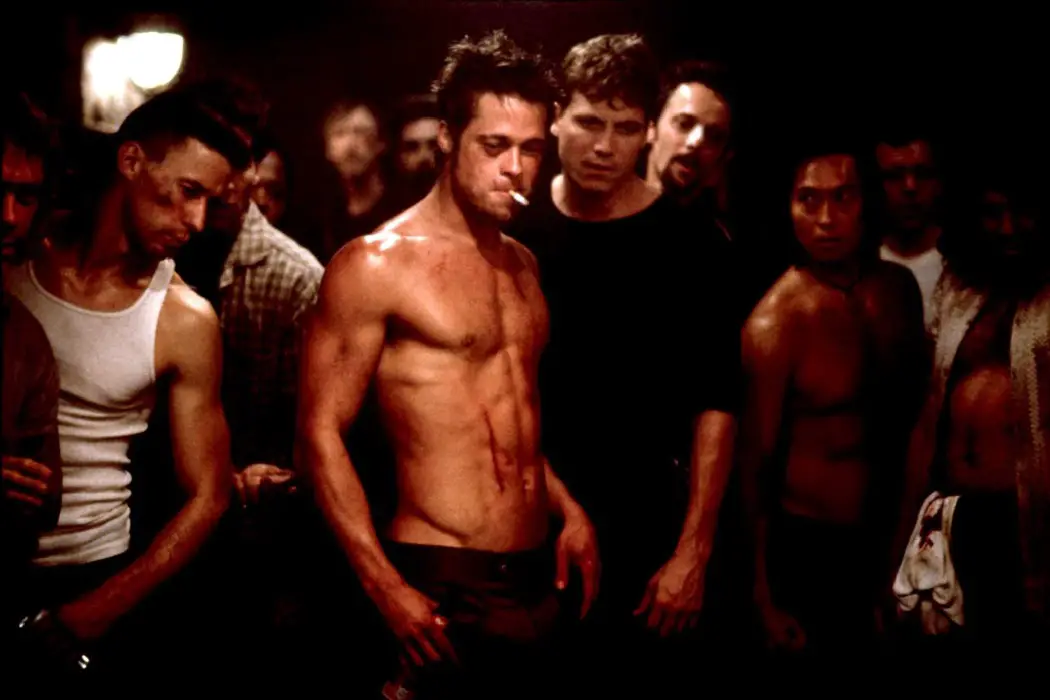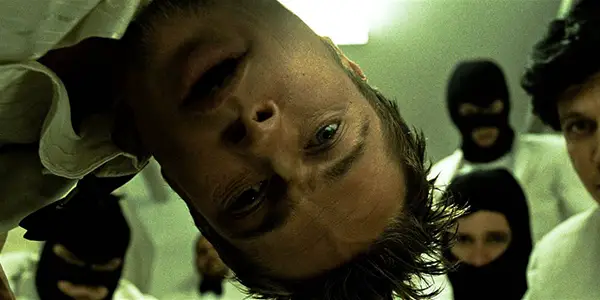FIGHT CLUB: The Movie, The Myth, The Legacy

Born & raised in the Chicagoland area, I've been watching…
What can be said about Fight Club that hasn’t already been said? It’s been hailed as one of the greatest and most influential films of all time, while its director David Fincher has since gone on to become more popular than ever in the cinema world (adapting and directing masterpieces such as The Social Network, Zodiac, and Gone Girl). The film is the epitome of a cult classic, polarizing critics and audiences alike when it first premiered.
Described as an accurate meditation on violence sure to incite behavior of the same likeness, Fight Club is more straightforward than other psychological thrillers but never stoops so low that it dumbs itself down for the sake of its audience. It’s easy enough to follow and its messages don’t take much of a toll on the brain in order to unscramble them. So what exactly makes it stand out from other psychological thrillers, the rest of Fincher’s library, and most modern cinema in general?
Plot Overview
Fight Club stars Edward Norton as an unnamed Narrator, an insomniac who meets a soap salesman named Tyler Durden (Brad Pitt). After returning to his apartment to find it engulfed in flames, the Narrator asks Tyler if he can crash at his place. After they continuously start fistfights in the parking lot of a local bar, other men join in and thus Fight Club is formed, acting as a place where they can fight recreationally. After blackmailing his boss and quitting his job, the Narrator discovers the trend of fight clubs is rapidly growing, just as Tyler is jumpstarting Project Mayhem, a terrorist organization that uses tactics of violence and vandalism to spread their cause of anti-materialism and anti-corporate activism.

After a member is killed in the wake of Tyler leaving, the Narrator follows Tyler’s trail, leading him to the realization that Tyler is a dissociated personality of the Narrator’s creation who takes over when the Narrator is supposedly asleep, explaining his insomnia. After uncovering plans to erase credit card debt from major corporations via the destruction of buildings that contain records. After shooting himself to make Tyler disappear, the members of Project Mayhem bring Marla (Helena Bonham Carter), a woman whom Tyler had become romantically involved with, to the building. She holds hands with the Narrator as they watch the buildings explode around them.
Interpretations
Over the years, there have been many interpretations of Fight Club and its themes, the portrayal of violence, and messages to its audience. Here are some explanations behind some of the many different theories as to what the film tackles.
Fascism
One of the most common interpretations of Fight Club is its potential portrayal of fascism. In the dictionary, fascism is defined as “a governmental system led by a dictator having complete power, forcibly suppressing opposition and criticism, regimenting all industry, commerce, etc., and emphasizing an aggressive nationalism and often racism”. Project Mayhem, one of the film’s major plot points, almost acts as a toxic-masculinity-driven response to feminism. The males who participate in Fight Club, and later Project Mayhem, are characterized (or lack thereof) by their anti-materialist way of life, stripping themselves of their names in an almost ritualistic manner, acting as modern terrorists and garnering their names back only in death.
One of the film’s first images is that of Edward Norton’s Narrator at a testicular cancer support group (which remedies his insomnia), trapped in a hug with Bob Paulson (Meat Loaf). The latter has developed “bitch tits” as a result of his cancer and has become estranged from his family as a result, which contributes to the world’s vision that feminism is something to be almost afraid of. The no-names policy is a metaphor for the identity-lacking counterpart in contrast to the modern “feminized” male. After Bob joins Project Mayhem, he is eventually killed during a mission and allowed to be “released” from the constraints of Project Mayhem’s no-names policy, treated as a fallen hero even when reverting back to his given name (which could be possibly seen to members of Project Mayhem as a sacrifice in death). It’s almost an examination of how certain men feel the need to be violent and nihilistic in the face of a modern era of gender equality, which is both smart and a bit self-indulgent at the same time.
Consumerism
Consumerist culture is defined as “the preoccupation of society with the acquisition of consumer goods”, and nothing could be more painstakingly obvious than that of the levels of consumerism evident during the time of Fight Club‘s release (which was 1999, of course). One of the most dead-center aspects of Norton’s Narrator is his characterization of a man deeply rooted in this culture. The film’s inciting incident is the destruction of the Narrator’s apartment containing all of his material items which had been described in incredible detail to the viewer only minutes prior, allowing them to be just as shocked as the Narrator himself is when he sees his living space in flames. It’s the epitome of a stereotypical mindset that viewers can relate to; to have everything that you’ve actually never needed stripped away from you in an instant, forcing you to question whether it was all worth it.
David Fincher has revealed in the past that there are cups of Starbucks Coffee in almost every shot of the film’s entirety, and fans have spent years scouring every shot to try and find all of them. One of the most downright hilarious things about this whole endeavor, however, is that those who spend their time searching time and time again for the coffee cups is that they are in fact contributing to the dark satire that Fincher paints oh so brilliantly. By contributing to a rush for instant-gratification among well-known and popular trends, it’s not hard to see what Fincher was gunning for in his messages and he actually hits his target quite well. Something all film fans can acknowledge is the way he makes a certain community behave in response to the film while in actuality mocking and ridiculing them from behind the camera.
Filmbro Culture
Over the course of the 21st century, the slew of cinema lovers has grown substantially, mainly due in part to up-and-coming directors such as Wes Anderson & Christopher Nolan in addition to modern masterpieces like La La Land, The Incredibles, and Drive. It’s no surprise that within these confines that a group of so-called “filmbros” has grown from the soil watered by these contributing factors. Everyone in the film community probably knows at least one filmbro. These are the members of the community who deride others for not sharing a certain set of opinions, while following the crowd and slapping five-star ratings on films because it makes them look more knowledgeable, who criticize those unable to understand a specific allegory while maybe not even being able to comprehend it themselves.

It’s not hard in this day hand age to come across one of these folk, and one of the surefire signs that they’re a filmbro is, ironically, their love for Fight Club. What makes filmbro culture so ironic in its entirety is that those who worship the film and utilize their force-fed knowledge of cinema to put down others is that they are essentially members of Project Mayhem themselves, unfuling hate among the masses (but verbally instead of physically).
Like mentioned previously, one of the things that makes Fight Club such an iconic cultural phenomenon is because it’ll always be an everlastingly prevalent as time goes on. Nihilism never dies, it just evolves and changes. In the age of toxic masculinity at its most unbearably malignant, films like this are able to effectively parody the spread of hate from one generation to the next. That’s why Fight Club is so important, and why it’ll be relevant for years to come.
What are your thoughts on Fight Club as it nears its twenty-year anniversary?
Does content like this matter to you?
Become a Member and support film journalism. Unlock access to all of Film Inquiry`s great articles. Join a community of like-minded readers who are passionate about cinema - get access to our private members Network, give back to independent filmmakers, and more.
Born & raised in the Chicagoland area, I've been watching films for as long as I can remember.













